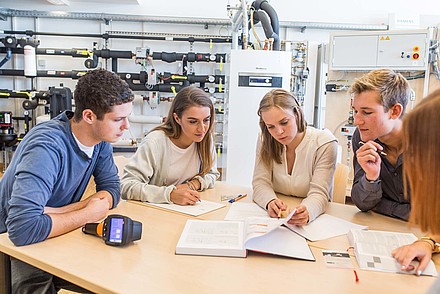
The “Green Building – Design & Engineering” degree programme rains a new generation of engineers in the construction industry who approach sustainable building for the future with a holistic perspective.
We provide you with expertise in key areas such as:
- Sustainable architecture
- Engineering and natural sciences
- Building and construction technology
- Energy and information technology
- Social, communicative, and economic fields
The buildings of the future are not only places for work, living, and daily life with enhanced functionality, but are also characterized by efficient use of energy and cost resources. The part-time Bachelor’s program trains professionals who combine theoretical and practical knowledge in structural engineering, building technology, and the latest technologies and building systems.
The program emphasizes a holistic, systemic approach to intelligent buildings, as well as the responsible use of natural resources while maintaining economic interests. In addition to the traditional disciplines of civil engineering, the focus of the program lies on building technology, energy and information technology, and specializations in the field of Smart Building.
Part-Time Study Program:
The part-time format of the program offers students the opportunity to immediately integrate the knowledge they acquire into their professional work and to apply their newly gained technical competencies in practice.
Credit Transfer for Courses:
Individual courses may be credited based on specific prior knowledge (e.g., completion of a technical college – HTL). Applications for credit transfer can only be submitted during the semester in which the respective courses take place.
No specific prior technical knowledge is required for admission to the Bachelor’s program.
Skills and Educational Objectives
As a graduate, you will possess expertise in the classical engineering and natural sciences, as well as specialized knowledge in building and construction technology and energy and information technology. The social, communicative, and economic competencies you acquire during your studies will enable you to work project- and team-oriented, as well as to implement and evaluate global projects across all areas of the energy and construction industries.
You will play a key role in the responsible use of natural resources while maintaining economic viability. Placing people and their environment at the center of new and sustainable developments, and fostering acceptance of positive social change, are core principles of your professional identity as a member of a new generation of experts in energy and construction engineering.
The program maintains a close collaboration and knowledge exchange with the degree programs Wood Technology & Construction and Information Technology & Systems Management.
Curriculum Structure
The curriculum covers the general capabilities associated with the technical-scientific subjects. In-depth technical and specialised skills are imparted on the basis of the said general capabilities. The interconnected and all-inclusive approach links the following aspects:
- Life-cycle of a building
- Energy-efficiency and interconnected building technology
- The building in its surroundings
The first academic year - Basic principles
In addition to covering the initial project work related to the field of smart buildings, the first academic year also imparts basic knowledge in the fields associated with the general technical skills in question, the systematic competencies and the socio-communicative competencies.
Natural sciences and engineering:
E.g. mathematics, physics, statics and constructional physics
Structural engineering and building technology:
E.g. Basic knowledge about the fields associated with structural engineering, the analysis of materials, construction and architecture, the basic principles of constructional planning, the principles of ecological and sustainable construction
Design & blueprint:
E.g. standardised representation of components and component groups in design drawings, detection and representation of issues relating to three-dimensional architecture or abilities in the fields associated with tendering, time management and project management
The second academic year - Specialisation
In the second academic year, you can choose one of the following two specialisations: "Selected Chapters Systems" and "Selected chapters Constructions". Furthermore, when it comes to the following fields, you will deepen your abilities and technical skills and build on the basic principles that you were introduced to during the first academic year:
Energy technology and control engineering:
E.g. Computer systems and networks, concrete IT-related problems, basic principles of energy technology and the production of energy in a manner that takes efficiency and the conservation of resources into consideration, control engineering and the relationships between smart grids and smart buildings
Structural engineering and building technology:
E.g. Climate change and its causes, energy industry, assessment of innovative technologies, overview of the automation systems used in buildings, the planning processes used for heating and ventilation systems, the process associated with sanitary planning, air-conditioning
The third academic year - Professionalisation
The third academic year is geared towards laying the groundwork for an eventual career track and preparing for the master's course that may be taken up after the bachelor's programme has been completed. The technical expertise that has been acquired complements the students' professional skills. You professionalise the knowledge that you have acquired in your chosen field of specialisation (smart building systems or smart building constructions). In both specialisations, you become familiar with complete solutions for building-systems and learn to develop, quote and implement the process in which the building is constructed. Furthermore, you can, within the framework of the academic programme, acquire certificates that relate to the latest certification systems (e.g. the certificates possessed by energy advisers).
Smart skills - Additional skills
The process by which the students acquire socio-economic and economic abilities and project management skills is a cumulative process that spans the entire duration of study (six semesters). In case of the domains in question, you develop your individual social and communication-related skills, learn how to use techniques and instruments in a targeted manner to write bachelor theses and research papers, and become familiar with new methods and techniques which aim to promote the creation of creative and divergent intellectual approaches.
